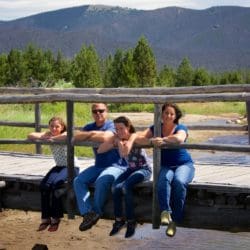For everything he loses, I try to find something to take its place.
At what moment did you realize you were a military caregiver?
I realized I was a military caregiver when I recognized that I would have to quit my job to devote myself to taking care of my husband. The defining moment came after he got lost trying to meet me at his favorite pizza joint and was half an hour late—seriously late for this strict military man. When I called to find out where he was, I found he was across town in a parking lot and could not remember where he was supposed to be. In the past, being a lawyer had defined my identity but I soon discovered I wasn’t really losing anything by not practicing law. I could still use my skills and education to be an effective healthcare advocate for him and my family.
How do you address some current challenges?
The residual effects of Tad’s brain injury are progressive. The question becomes, “How do we maintain a good quality of life for Tad knowing he is developing early onset dementia/Alzheimer’s disease?” For everything Tad loses, I try to find something to take its place. For example, Tad can no longer ride a motorcycle, so we replaced it with an RV so we can go camping.
How has being a military caregiver changed you?
Becoming a military caregiver has made me more patient. Before I say things I stop, step back and think, “Is this him or is it the brain injury?” I’ve also become more carefree, because I never know what will happen tomorrow, or even today.

My Story
Robyn had dated Tad in high school. They crossed paths again when they were in their forties, right after Tad had retired from a 22-year career as a combat engineer specializing in bomb detection, disposal, and route clearance in the Army. Robyn was taking a break from her law practice to raise her children and write a book. Together, they sought innovative methods of healing Tad’s multi-symptom conditions from neurotoxic exposure in the Gulf War (“Gulf War Illness”), spinal damage from Airborne jumps, traumatic brain injury (TBI) from improvised explosive device (IED) explosions, and post traumatic stress.
As a Dole Caregiver Fellow, Robyn helps other caregivers thrive in their roles through supporting education, optimism, and belief in their unique power to create change.












